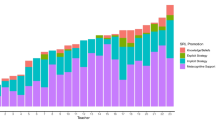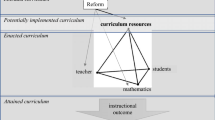Abstract
The purpose of this paper is to inquire into the developmental directions and tasks of the School Based Curriculum Management(SBCM) system. The concept of the School Based Curriculum Management can be considered as a subsystem to School Based Management. The logics behind the SBCM system are autonomy, accountability, effectiveness, creativity, professionalism, and participation. The developmental directions of SBCM are to establish and implement the highly autonomous and participative SBCM, the diverse creative SBCM, the highly accountable SBCM, and the professional SBCM. The developmental tasks of SBCM suggested in this study are to establish the School Based Staff Development system, to practice the evaluation system that can control the quality of SBCM, to be managed by a strategic-layer management system, and to constitute the committee of school curriculum.
Similar content being viewed by others
Reference
Cheng, Y. C. (1996).School Effectiveness and School Based Management. Washington, D C: Palmer Press.
Cheol-Soo, Park. (2000).Problems and Developmental directions of School Based Management. Dissertation, Cheonpook University, Jeonju, Korea.
Chong-Yul, Park & Soon-Nam, Kim. (2001).Theory and Practice of School Based Management. Seoul: WonMiSa.
Chong-Yul, Park & Soon-Nam, Kim. (2002). An Inquiry on the Logics and Strategies of School Based Curriculum Management,The Journal of Curriculum and Evaluation, 5(1), 35–49.
Gyan-Suk, Hong. (1996).Practical Strategies of School Based Management. Dissertation, Kyungpook National University, Daegu, Korea.
Gyan-Suk, Hong. (1999).School Based Management. Seoul: SeoKyung Inc.
Ho Soon, Bae. (1996). Inquiry the Method of Quality Manangement of School EducationThe Study of Educational Administration, 14(4), 154–180.
In-Sik, Kim, et. al. (1998).Inquiry of School Centered Curriculum. Masan: Kyungnam University Inc.
Jae-Bok, Kim, et. al. (1999).Interpretation of the 7th curriculum. Seoul: Educational Science Inc.
Keung-Ja, Kim. (2000).School Curriculum. Seoul: JisunSa.
Myung-Han, Kim & Chong Yul, Park. (2001).Educational Administration and School Management. Seoul: HyeugSeol Inc.
Meong-Po, Choi. (1995).Practice of Making and Operation of School Curriculum. Seoul: SinA Inc.
Purkey, S. C. & Smith, M. S. (1985). School Reform: The District Policy Implications of the Effective Schools Literature.The Elementary School Journal, 85(December 1985).
Se-Hoon, Park. (2000). Conditions and Outcomes of the School Based Management.The Study of Educational Administration, 18(4). 33–68.
Soon-Nam, Kim. (2003). An inquiry of Logics and Strategies of School Based Management,Korean Education, 30(2), 91–114.
Tae-Bum, Jeong. (1998).Supervision. Seoul: Educational Science Inc.
The Korean Society for the Study of Educational Administration. (1999).School Based Management. International Seminar.
Author information
Authors and Affiliations
Corresponding author
Rights and permissions
About this article
Cite this article
Kim, S.N. The developmental directions and tasks of the school based curriculum management system in Korea. Asia Pacific Educ. Rev. 6, 41–49 (2005). https://doi.org/10.1007/BF03024966
Received:
Revised:
Accepted:
Issue Date:
DOI: https://doi.org/10.1007/BF03024966




